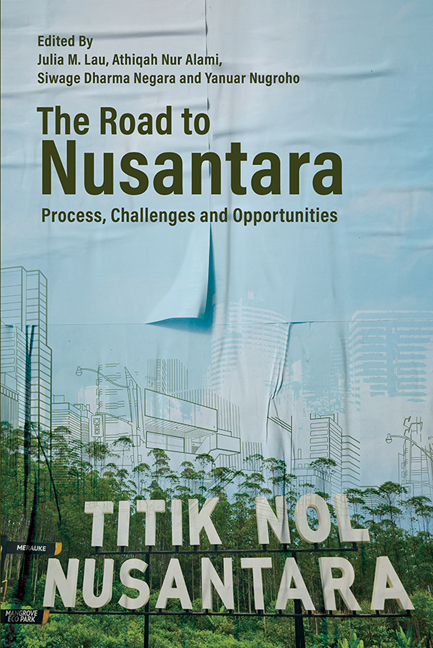Book contents
- Frontmatter
- Contents
- List of Figures
- List of Tables
- Foreword
- Foreword
- The Contributors
- Glossary
- Introduction: The Road to Nusantara—Process, Challenges and Opportunities
- PART I PROCESSES AND PATHWAYS TOWARDS NUSANTARA
- PART II CHALLENGES IN DEVELOPING NUSANTARA
- PART III OPPORTUNITIES FOR NUSANTARA
- Conclusion: Shaping Nusantara
- Index
6 - The Transfer of the National Capital (IKN): The Domination of the Capitalist Political Economy and the Dynamics of Local Representation
Published online by Cambridge University Press: 01 March 2024
- Frontmatter
- Contents
- List of Figures
- List of Tables
- Foreword
- Foreword
- The Contributors
- Glossary
- Introduction: The Road to Nusantara—Process, Challenges and Opportunities
- PART I PROCESSES AND PATHWAYS TOWARDS NUSANTARA
- PART II CHALLENGES IN DEVELOPING NUSANTARA
- PART III OPPORTUNITIES FOR NUSANTARA
- Conclusion: Shaping Nusantara
- Index
Summary
Introduction
Maaf ya pak, kalau suku Jawa kan bisa kembali ke Jawa. Suku Balik ini kemana kalau tanahnya tidak ada. Kita (tanah airnya) hanya di sini. Sejarah Orang Balik kemana? Hilang!
“I’m sorry, sir … if the Javanese can return to Java, where do the Balik tribe return to if their land is not available? We (our tribal homeland) are only here. Where is the history of the Balik tribe? It is lost!”
The opening is a direct quote from an interview with a person (“M”) from the Balik tribe, one of the indigenous groups that have resided for generations in the new IKN location. There are concerns that the IKN development project could further marginalize the Balik tribe, who were already marginalized due to the development of Balikpapan City as an oil-producing and oil-processing town. The Balik tribe has argued that the transfer of IKN is an elitist, centralized policy, as it is lacking meaningful participation from the community in the planning process. This opinion is based on their experience of being excluded at all stages of construction, including when the government of the subdistrict marked the land for the planned location of the national capital. When the Balik tribe informed the government of the subdistrict about the capital transfer's possible effect on this tribe, the subdistrict government claimed not to understand the matter because the determination was in the hand of the central government.
The IKN Law was ratified on 7 December 2021, after Indonesia's legislature considered and passed the proposed law in just forty-two days. The bill had incurred public resistance because public involvement in the deliberation process was insignificant. Procedurally speaking, indigenous peoples should have been involved in the initial consultation on IKN because they have long resided in the area to which the national capital will be moved. Apart from that, the IKN Law substantially contradicts at least eight articles in the 1945 Constitution. For instance, Article 1(2) of the Constitution stipulates that “sovereignty is in the hands of the people and implemented according to the 1945 Constitution” while Article 18B(2) stipulates that the State recognizes and respects customary law communities and their traditional rights, as long as they exist and abide by the principles of the unitary state of the Republic of Indonesia.
- Type
- Chapter
- Information
- The Road to NusantaraProcess, Challenges and Opportunities, pp. 125 - 149Publisher: ISEAS–Yusof Ishak InstitutePrint publication year: 2023

